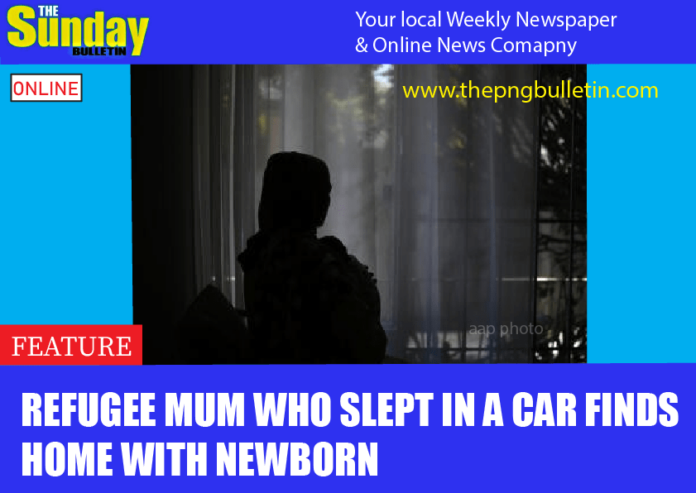AAP: AN Afghan woman who was homeless after escaping domestic violence has secured housing in time for the birth of her daughter with grassroots community support.
Mariam watches over her new born girl in the safety of her recently moved into rental home after a harrowing few years where she escaped an abusive ex-husband who beat her when she was previously pregnant and had a miscarriage.
The 25-year-old Hazara Afghan woman grew up as a refugee in Pakistan and settled in Australia in 2016 as a teenager before getting married a few years later.
But the relationship was marred by violence and turbulence.
“When I was pregnant he started the violence again and he wanted me to have an abortion,” she told AAP.
She recounted how her ex-husband kicked her out of the house and she bounced around staying at her parents who were pressuring to get back with him, couch surfing with friends and even some nights sleeping in her car.
“It was so hard, out of control, I didn’t have any support, my relationship with my parents broke down. I was alone in this world.”
Mariam remarried and gave birth to a baby girl in November. (Aap Image/AAP PHOTOS)
Hazaras are a Shi’a minority in Afghanistan and have been long persecuted for their ethnicity and religion, which became even more extreme under the hardline Taliban who swept back into power in 2021 unseating the weak US-backed government after the 2001 invasion.
Her ex-husband was also Hazara but he had threatened Mariam that he knew Taliban militants in Afghanistan who would kill her brother there if she did not abort the baby after she was 15 weeks pregnant.
All the undue psychological pressure and physical beatings such as pushing her violently across the kitchen table took a toll on her body and she had a miscarriage in a Melbourne hospital, she said as she choked back tears.
Mariam, who is providing a name she uses on social media in order not to be publicly identified for her safety, recently remarried with her husband visiting from Pakistan to be with her when she gave birth to a baby girl last month.
With the help of the Melbourne-based charity Avalon Centre she was able to secure a two bedroom unit weeks ago in Dandenong, which has the highest number of homeless people of over 2300 in Victoria according to official figures.
Deborah Holmes who heads the volunteer-run organisation says the grassroots Avalon Homes for the Homeless provides stable furnished homes for vulnerable members of the community with ongoing casework support.
“We’ve got a mission statement to help where we can, when we can, and in whatever way we can,” she told AAP.
“We’re offering a hand up not a handout.”
The community organisation owns about 15 properties and relies entirely on donations from the public to pay off the loans.
Ms Holmes said every dollar counts towards getting people off the streets and into new homes at a time when domestic violence rates spike around the holidays.
She and a team of volunteers worked around the clock to get the place ready for Mariam to move in with her baby earlier this month.
“If that’s just two cups of coffee a day and four friends then you can put a roof over somebody’s head.”
RMIT Senior Lecturer Rojan Afrouz, who has conducted extensive research into domestic violence among Afghan refugee women in Australia, explains they contend with cultural barriers such as not being fluent in English as well as regressive community attitudes.
“The main point that Afghan women raised was community pressure and shame and blame, and also that cultural and gender norms were stronger here (in Australia) than back in their own countries sometimes,” she said.
Dr Afrouz said even though domestic violence as a social phenomenon affects women of all backgrounds in Australia, it is doubly hard for refugees who carry multiple levels of trauma.
“Afghan women face a lot of stigma and shame when they want to get a religious or civil divorce… sometimes it is more important than access to mainstream services.
“This is because the main action that you need to do is making the decision whether you want to leave or not and the social consequences of that,” the social work academic explained.
She advocated for a woman-centred approach that is consultative in policymaking that ensures their agency is the prime objective.
“We have to make sure that we put women’s self determination experiences, not community self determination, at the forefront because sometimes minority women’s voices are lost.”
This was Mariam’s experience where she felt shunned from the tight-knit community by wanting to flee an abusive relationship.
“My mental health was so bad… it was stressful and painful… everyone was blaming no matter what I said.”
She feels comfortable and safe in her new home with the ongoing support of her social worker and the Avalon Centre vowing to get back on her feet one day at a time.
“Alhamdulillah (Thank God) everything is different now. I shut the door and feel safer than before,” said Mariam.
“My safety and my baby’s safety is more important than anything… I don’t want to lose everything again.”

